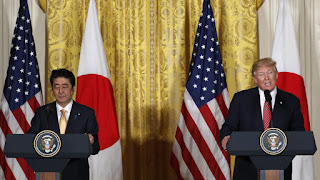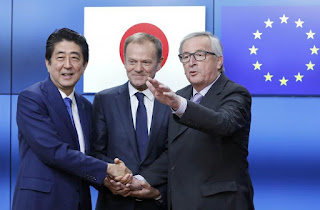As Ukraine's political crisis poisons Russia's relationship with the West, Moscow is increasingly talking of China as a possible replacement for the European Union as Russia's key economic ally.
Such a pivot would mean Russia exchanging a partnership with the world's most economically developed region for closer ties with another developing nation. How will that shift transform the Russian economy?
Analysts interviewed by the Moscow Times said China can become a good-enough, if imperfect, replacement for the EU in most sectors of Russia's economy, including petroleum exports, technology and investment.
But an alliance with a developing nation would only solidify the economic status quo, they warned, doing nothing for Russia's chances of moving beyond a commodity economy.
Also, embracing China as its sole economic ally risks giving Beijing de facto control of the Russian economy — though that can be avoided if Moscow remembers to diversify its economic ties. What does a 30 year 400 billion dollar gas deal actually mean between two emerging economies that are still far from being a "superpower" in any sense of the term?
The deal is big for Gazprom and for the Chinese lust for a coal alternative. But both are still major rural and agricultural nations that have industrial capabilities. Both are far from the technology innovators and financial capitals of Europe and the US, or even Japan and South Korea. Neither has a Google, an Apple, a Samsung, a Toyota, or any innovative company that is not reliant on a joint venture with a Western corporation. Most of Russia's joint ventures are in alternative energy, their consumer products are South Korean, Japanese, German, and American. The same for China except where the government can use Chinese nationals in Europe and the US to steal technology and plans. Again, this will not help to create a climate of trust. In an alliance of thieves where is integrity or trust?
First Steps
And diversification seems to have been low on Russia's priority list in recent years, said Vasily Kashin of the Moscow-based Institute of Far Eastern Studies: Currently, Russia's trade relationship is unhealthily skewed toward Europe.
"We are just a raw materials supplier for a single market now," Kashin said. "So we can at least make it more than one market."
Russian exports to the EU stood at $238 billion, significantly above the imports, worth a mere $134 billion, according to the Federal Customs Service. Exports to China were at $35 billion over the same period, compared to $53 billion in imports.
Moscow has spent years mulling an eastward move, which can only be done through oil and gas, the linchpin of the Russian economy and the main reason to embrace Russia both for Brussels and for Beijing.
A breakthrough came Wednesday, when China signed a long-delayed 30-year deal worth $400 billion to buy Russian gas. The final price was not made public, but is estimated at $350 per 1,000 cubic meters — at the lower end of the price range Russia gets from European buyers.
The EU has long declared that it wants to cut dependence on energy exports from Russia. The issue has snapped into focus thanks to the crisis in Russia-West relations caused by the standoff in Ukraine, where Brussels and Moscow back opposing sides in a tense and occasionally bloody standoff teetering on the brink of civil war.
However, changing the direction of gas exports would take several years — most Russian pipelines are westward-bound.
Natalya Orlova, chief economist at Alfa Bank, sees benefits for both sides in Russia's reorientation east — Europe would diversify its energy imports, she said, while Russia could reduce the dependence of its economy on political conflicts like the one unfolding over Ukraine.
Luring In Chinese Money
European funds accounted for 75 percent of all direct foreign investment in Russia as of 2012, the latest year for which the Russian Mission to the EU has released figures. Russian official statistics put total direct foreign investment for that year at $18.6 billion.
European businesses have so far been keen to invest in Russia because it was outpacing the EU on growth, Orlova said. European funds have flowed into sectors ranging from energy to construction, IT, retail and manufacturing.
But whether China is interested in the Russian market beyond oil and gas is open to question.
China trounces Russia on economic growth, achieving 7.7 percent last year as against Russia's 1.3 percent. This means that Chinese investors, unlike European ones, will get a better return on their capital if they invest it at home, Orlova said.
"Chinese investment in Russia has been a trifle compared to investment from the rest of the world," agreed Konstantin Styrin, a professor of the Higher School of Economics in Moscow. "We have nothing to offer [the Chinese] but oil."
But Kashin pointed out that the Chinese government is still encouraging businesses to invest abroad, which means at least some of the money will likely trickle down to Russia. China is chiefly interested in infrastructure and trade, but would invest in major industrial projects in Russia if they are well pitched and backed by the state — which basically leaves the ball in Moscow's court, he added.
While the deal will be paid in the local currencies by abandoning the dollar both risk a financial crash. Both China and Russia play too many games with their currency values and this will likely cause both to become distrustful and suspicious. Many in Putin's regime are already questioning the logic of dumping the dollar. China simply has rigged its currency valuation and Russia does the same to get an upper hand on exchange.
Neither has shown an interest in changing their valuation being linked to non-currency backing. Neither China nor Russia have a reserve bank like European nations or the US that actually has the authority to reign in over aggressive currency printing. This may what begins a long list of complaints against the other. Neither Putin nor Jinling actually trrust each other. Medvedev and Xi also are said to be rather suspicious of the other.
Copying From Copycats
What Russia gets from Europe is technology: High-tech products and industrial equipment constituted 47 percent of imports inbound from the EU in 2013, according to Europe's statistics service, Eurostat. In contrast, 77 percent of Russian exports to the EU are oil and gas.
China, a developing nation, is no match for Europe when it comes to innovation, Styrin said.
But technology can still be had from China, which, while not a trailblazer in this field, is good at adopting advances made elsewhere and is not picky about sharing it, according to Kashin, who added: "It is not state-of-the-art, but it is good enough for us."
Besides, he said, many products imported by Russian companies from Europe are already Chinese-made — they are purchased in the West simply because the market is more familiar to Russians, where more businessmen read English than Chinese.
This is another issue that is likely to cause trouble. All through the talks leading to this deal, which was nearly abandoned altogether Tuesday, the delegations became flustered when translators had to be changed for rest. One Russian negotiator complained, "We are wanting to trade with people who understand nothing of Russia. This is insane." The Chinese delegation also found it irritating that "Russia wants us to spend our money in their gas but cannot provide anyone who speaks Chinese." The talks having to be translated into English shows neither side is taking the other seriously and went in expecting the other to acquiesce to them. Not a good beginning, the honeymoon is over before it began.
Alone With the Celestial Empire
The expert consensus was that Russia's main risk is over-reliance on China at the expense of other potential partners — China will have no qualms exploiting an over-exposed Russia if it can.
"China gets a very strong negotiating position" if Russia cuts ties to Europe, Orlova stated. Styrin was less equivocal, speaking about the risk of Russia becoming "hostage to buyer's market."
But Styrin also said the talk about severing ties with Europe is likely just a smokescreen for geopolitical bargaining over Ukraine and not a serious strategy.
And if Russia manages to strengthen its link to China while keeping other economic partners it would not bring about any structural change to the economy, but would actually be a long-awaited boost to development, Kashin said.
"If that happens, you could say this Ukrainian nightmare had some unexpected benefit, prompting an overdue move for which we have long lacked the political will," he said.












